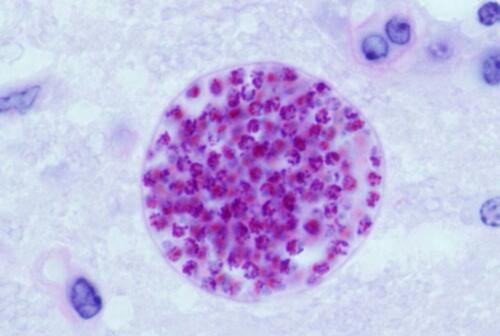Humans Infected With ‘Mind-Altering’ Parasite Seen As More Attractive
Authored by Ross Pomeroy via RealClear Science,
The single-celled protozoan Toxoplasma gondii is a fascinating parasite. Replicating only in cat intestines, it is excreted in feces and subsequently spreads to many other organisms, not just felines. Inside these critters, it winds its way to the brain and transforms into numerous cysts, patiently waiting to return to its desired nine-lived host. But, though dormant, it is not entirely inert. T. gondii actually alters its host’s behavior. Mice, for example, grow less fearful of cats, making them easier prey. Just like T. gondii wanted…
Humans are also affected by T. gondii. About one in ten Americans and a third of people globally host the parasite. And yes, it seems to sneakily mess with our minds, too. Studies suggest that infested humans have ever-so-slightly impaired motor skills, undertake additional risks, and get into more automotive accidents. The parasite’s presence is also linked to an elevated risk of schizophrenia.
Curiously, as as new study published in PeerJ finds, T. gondii may also change humans’ physical appearance. An international team turned up a link between a latent infection and facial attractiveness. The researchers recruited 213 healthy college students at the National Autonomous University of Mexico, all of whom had previously been tested for T. gondii. Thirty-five subjects (22 men and 13 women) had the parasite, while 178 (86 men and 92 women) did not. The researchers then asked the subjects various questions and took pictures of their faces.
Next, another 205 participants each viewed a random collection of twenty of these pictures, ten of Toxoplasma-positive subjects and ten of Toxoplasma-negative subjects, rating each pictured participant for facial attractiveness and perceived health on a 10-point scale. (Raters were not told of participants’ Toxoplasma status.) Overall, raters judged Toxoplasma-positive subjects to be significantly more attractive and healthy-looking than Toxoplasma-negative subjects.
“T. gondii infection may produce changes in facial symmetry of its hosts through changes in endocrinological variables such as testosterone levels,” the researchers wrote. “These changes, both in the endocrinology system and in facial symmetry, would ultimately benefit the spread of the parasite by increasing the attractiveness of its hosts.”
Indeed, as the researchers measured, participants with T. gondii tended to have more symmetrical faces. Facial symmetry is commonly associated with beauty.
Other parasites are known to affect the physicial characteristics of their animal hosts. Moreover, previous studies showed that men infected with T. gondii have higher testosterone levels. However, a simpler explanation for the association is that attractive people are more likely to contract T. gondii as they might engage in more sexual activity. (T. gondii can be transmitted sexually.) The researchers did find that Toxoplasma-positive subjects reported having more sexual partners.
More research is needed to confirm the study’s intriguing finding, so don’t go seeking out cat feces just yet in the hopes of making your face more alluring.
Source: Borráz-León JI, Rantala MJ, Krams IA, Cerda-Molina AL, Contreras-Garduño J. 2022. Are Toxoplasma-infected subjects more attractive, symmetrical, or healthier than non-infected ones? Evidence from subjective and objective measurements. PeerJ 10:e13122 https://doi.org/10.7717/peerj.13122
Tyler Durden
Fri, 04/01/2022 – 21:00

